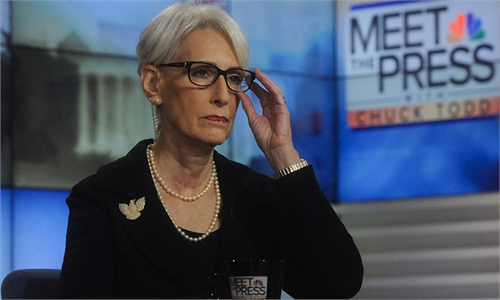
Huawei's Chief Financial Officer Meng Wanzhou, wearing an electronic ankle tag, leaves her home for a court appearance in Vancouver, Canada, on October 1, 2019. Photo: VCG
Jody Wilson-Raybould could have done that in December 2018, but at the time she was deeply engrossed in her ongoing catfight with the prime minister over the SNC Lavalin Affair. The PM wanted to defer prosecution of the corporation because it might cost the company many jobs, but Wilson-Raybould refused.
Knowing her disposition at the time, the International Assistance Group (IAG) of the Department of Justice was understandably reluctant to advise the minister to intervene in Meng's contemporaneous case. Acting like robots controlled by the US, the IAG issued a provisional arrest warrant against her. In effect, the US said "Jump!" and the Canadian bureaucrats asked meekly, "How high?"
They knew that it was highly unusual for the CFO of a major international corporation to be arrested on a provisional warrant for an alleged corporate misrepresentation: If that were standard practice, half the ranking politicians in America, could be arrested on suspicion of "misrepresentation."
But while it protects its own, the US, it seems, is all too willing to use its prosecutorial powers against rival non-American corporate competitors. It did not want Huawei to control 5G technology anywhere in North America.
Huawei was ahead in the race to develop 5G technology, and was promoting itself in Canada and Mexico on this front when the US intervened to protect the interests of its own corporations. But the US did so in a sneaky way: It asked Canada to arrest Meng when she had a stopover in Vancouver en route to Mexico City - a city that would no doubt greatly benefit from the latest 5G technology.
The US was so anxious that one of its own corporate "runners" won the race that it cheated in - with Canada's help - by tripping the lead runner.
Once Meng was arrested, the minister of justice had two months to review the case and decide whether to convert the provisional arrest into a formal extradition proceeding. Up to this time, the US had provided no summary of the case against her. It used the two months to prepare a "record of the case" which alleged that Meng had made misrepresentations in a PowerPoint presentation to the HSBC at a restaurant in Hong Kong.
Canada knows that, like the US, it has no jurisdiction to prosecute conduct that takes place in a third country, by a national of that country, with a bank registered in a fourth country - the United Kingdom. In pursuing Ms. Meng, the US has attempted to set itself up as an international policing agency.
This in itself should have tipped off a diligent Canadian minister of justice that the US was acting beyond its jurisdiction. But instead of dropping the hot potato, as advised, the new Minister of Justice David Lametti issued an Authority to Proceed, sealing Meng's fate for years to come.
Lametti parroted the reasons given by Prime Minister Justin Trudeau in an off-hand remark at the very beginning of this debacle: That Canada has to follow the "rule of law." That is a ridiculous cop-out that shows an ignorance of extradition process.
The "law" here is the Extradition Act, which clearly gives the Minister of Justice the power to say "No" if extradition is not in the best interests of the country. Under section 23(3), the minister can order Meng to be discharged at any time - and the court must comply.
The Chinese government knows this also: It can read the Act. Extradition is not a legal or judicial issue, and it never was. It is a matter of political will. China knows that the legal proceedings are a red herring - an option, not a "rule."
It appears that the US has thrown out its net too far, and has caught a big fish along with all the little fish it can usually capture through assuring "conspirators" that they will receive reduced sentences if they implicate others in their alleged crimes - a method that has worked in America since the witch hunt days. Here, however, the US used a sprat to catch a mackerel - and has landed a shark.
The solution? Cut everyone loose.
The author is an extradition lawyer and author of Canadian Extradition Law Practice. opinion@globaltimes.com.cn



